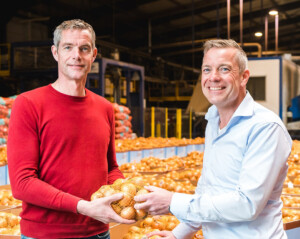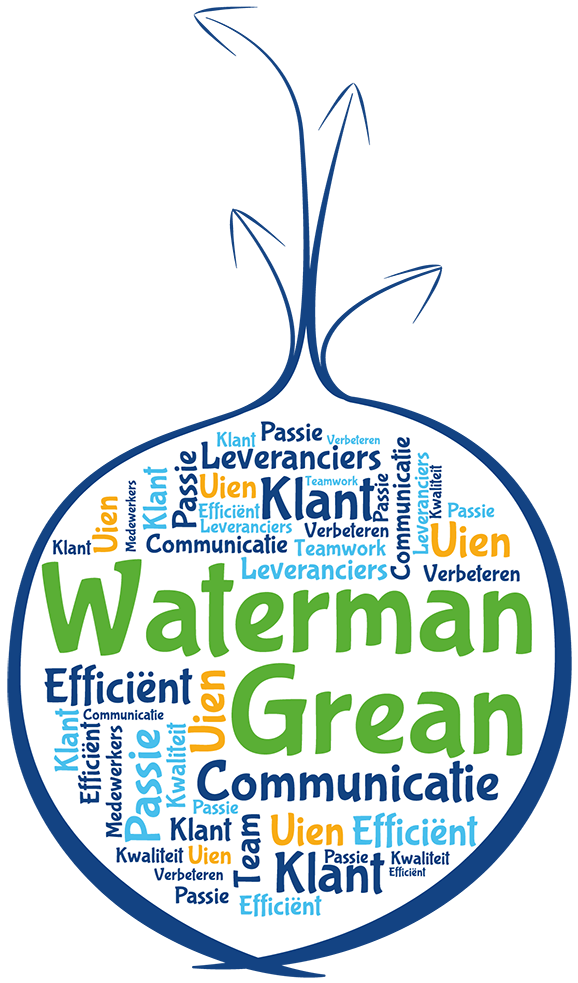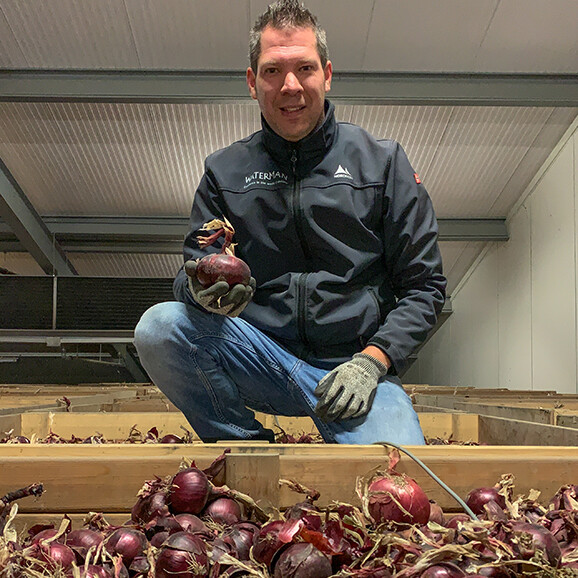A look back on the sales season for Uienzaadonline.nl
More and more growers are discovering the simplicity, service and competitive prices of Uienzaadonline.nl
More and more growers are discovering the simplicity, service and competitive prices of Uienzaadonline.nl
“We’re usually at Fruit Logistica in Berlin or skiing. Now, we’re sitting, staring at each other,” jokes Erik Waterman of Waterman Onions in the Netherlands. That was in February. He was referring to the temporarily quiet onion market. Nevertheless, according to him, this dip is normal for the beginning of the year. “It’s never been otherwise. But we usually leave the road at 140km/h (87mph). Last fall, we thundered along at 220km/h (137mph). We had several export weeks of 40,000+ tons/week. Then, you’re quickly disappointed when you have to return to driving the regular 100km/h (62mph).”
 “Added to that, growers and asking prices don’t match. You can lower prices, but if farmers’ prices don’t fall, the price has to rise again. Many sorting and packing stations have run out of stock and have had to make additional purchases. I think bale prices will increase rapidly. In any case, the upward journey has begun again. The European sales season is about to begin, although it’ll be gradual. To use a metaphor, the party has begun, but not everyone’s joined in yet,” continues Erik.
“Added to that, growers and asking prices don’t match. You can lower prices, but if farmers’ prices don’t fall, the price has to rise again. Many sorting and packing stations have run out of stock and have had to make additional purchases. I think bale prices will increase rapidly. In any case, the upward journey has begun again. The European sales season is about to begin, although it’ll be gradual. To use a metaphor, the party has begun, but not everyone’s joined in yet,” continues Erik.
“Grower prices were high in autumn last year. If they hadn’t been, sales would probably still be continuing. Sales prices rose sharply due to the large, broad worldwide sales and India’s export stop. Now everything is returning to normal. We have to compete on the world market again. However, farmers’ prices have only fallen slightly. The available onion quantity for the rest of the season is rapidly diminishing too. And farmers are patient. Because what onion grower with good onions wouldn’t wait for better sales opportunities later in the season?”
Import onions are on their way again too. “We import mainly from New Zealand, South Africa, and Egypt, with mostly red onions from the latter. We consider imported onions as a good addition to the Dutch range. There’s always room for good quality onions in the retail and trade sectors. And fortunately, we’re able to supply these to our clients year-round. But excellent quality comes at a price. Which clients gladly pay,” Erik explains.
Waterman Onions doesn’t yet optically sort its onions. The company is, however, watching developments in that field closely. “We aren’t pioneers, nor are we lagging. But we want to eventually start using a good, proven method. There are several projects in the Netherlands involving optical sorting. They’ve had their share of problems.”
“They haven’t yet shown excellent, but above all practical, results either. So, there’s still a ways to go. The improvements being made will, however, certainly finally pay off. We’ve planned a 20,000m2 expansion. As soon as we can scale up, we’ll consider how the latest techniques are faring,” Waterman says.
“We are also hard at work with innovative automation projects. These include fully automatic track-and-tracing for storage and processing. We’ve developed an app called StoPro. We want to work in a more data-driven fashion. We want to gain greater insights from data to improve our business processes further. We also want to make predictions and do future analyses. Supply and demand can be linked to production quickly, correctly, and efficiently in this way. So, we have plenty of challenges.”
The company is involved in a new development – the Port of Flevokust near Lelystad, the Netherlands. This container terminal opened in 2018. And it’s undergoing rapid development. That’s thanks to the cooperation between Maersk and some of its clients, including Waterman Onions. Maersk is an end-to-end containerized provider.
“This is a pioneering project. We were the first shipper there, and it took a lot of work to get everything running smoothly and efficiently. But it worked out. Now inland waterway transport, especially to Rotterdam, is increasingly financially successful. It’s also providing considerable environmental gains. We use it a lot,” says Erik.
Waterman Onions saw its sales rise dramatically in 2020. That’s thanks, in part, to onions becoming more popular. But that’s also due simply to the growth in the world’s population. Many of these people use more onions in their dishes than Western Europeans. “To get everything to all our global clients, on time, was, naturally, a huge challenge.”
“Logistics is one of an export company’s most important aspects. It was squeaking and creaking, but we made it work. We’re anticipating the coming year with great optimism. We, along with our suppliers, clients, and employees, will create something great,” Erik concludes. (Author: Izak Heijboer ©FreshPlaza.com)
erik@waterman-onions.nl
‘Waterman Grean’ is Waterman Onions’ own interpretation of Lean. Working according to the Lean method means constantly focusing on optimising processes in order to eliminate waste.
 “You can do that by collecting data on the various processes and departments to see how a department is performing. We then use that data to analyse what’s going well, and what could be done better to accommodate our customers’ preferences”, explains Arjan Dunnewind, Operations Manager at Waterman Onions.
“You can do that by collecting data on the various processes and departments to see how a department is performing. We then use that data to analyse what’s going well, and what could be done better to accommodate our customers’ preferences”, explains Arjan Dunnewind, Operations Manager at Waterman Onions.
He continues: “Then we want to seize as many opportunities as possible; from quick wins to solving complex problems. We want to create a culture in which we grab problems by the neck and constantly look for solutions together. With Waterman Grean, we aim to work on making structural improvements for our customers’ benefit!”
As Arjan explains: “That will require different knowledge and expertise from us Watermanners. So we’re now offering training courses. Under the leadership of Menno Dijkstra, Director and trainer at Greansucces, around 30 of our colleagues are currently being trained in the Grean method. We’ll really start implementing Waterman Grean in late February. We discuss our results, activities and projects together in the employee cafeteria every day. Everyone, from purchasing to shipping, will be involved in Grean and can make a positive contribution. Because we have to seize opportunities together!”
Together we’ll make Waterman Grean exceptional; for our customers, our employees and our company!
In early 2020, Waterman Onions announced that the Purchasing Team would be reinforced with the arrival of purchaser Jelmer Elzinga in March. Since then, Jelmer has been responsible for the product flow of carefully chosen onions together with Remko Wilms and Nathan Rommens.
 How it all began
How it all began
Jelmer has been working as a purchaser at Waterman Onions for almost a full year now. He started in a turbulent period, just as the first intelligent lockdown was implemented in the Netherlands. Since then, the Netherlands has been forced to deal with the consequences of the COVID-19 pandemic. The purchasing team has noticed some of its effects in its day-to-day work. As a purchaser, Jelmer tries to evaluate the onions purchased or offered together with the growers whenever possible.
Jelmer looks back on his first year: “Waterman Onions is a great company to work for. A lot is going on here, but we also see some room for improvement. Together with my colleagues in the Waterman Onions purchasing department, we try to keep the production lines supplied with the best possible input of onions. The onion sector is growing in the north and east of the country at the moment. When I first arrived at Waterman, I had the opportunity to purchase quite a few onions from a lot of growers, and many of them have already been processed and packaged for our buyers. It’s great to watch that happen!”
Quality in storage
Jelmer continues: “At the moment, we’ve noticed that there’s some variation in the quality of onion storage. Red onions are especially susceptible to damage from thrips, which can cause problems with peeled onions. It seems like thrips are causing more damage lately, in part due to the prohibition on IC seeds and the warm, dry summers. We’ve also noticed some problems with quality, bacteria and damage in yellow onions. But many parties don’t have these problems, and we’re still able to find enough high-quality onions to package over the coming months.”
Next season
“We’re all looking forward to a world without COVID-19. But here, we’re also looking forward to the new growing season. We expect a slight increase in acreage planted, and a shift in the growing area from the south to the north and east of the country”, says Jelmer.
Growers can also rely on us for another season’s supply of onion seeds via the recently launched website www.uienzaadonline.nl or by contacting Nathan or Jelmer. Jelmer: “Several popular varieties are already sold out, but we can still offer suitable recommendations for the grower regarding quality, transparency and a fair price.”
Did you know that Waterman Onions also supplies vegetables other than onions? Thanks to our broad network of suppliers, Waterman Onions can quickly package and deliver a wide range of fresh vegetables. That includes potatoes and cabbage, but we can also supply products such as garlic and ginger.
Waterman Onions offers one-stop shop service, where buyers can purchase, load and ship onions and other vegetables.
To find out more, please feel free to contact Waterman Onions Sales Manager Michel Veltman at
tel.: +31 (0)6 10 09 83 82 or e-mail: michel@waterman-onions.nl.

‘Are you 17+, looking for work and available in December? Then join us at Waterman!’ This was the call we sent out in our social media campaign over the last few weeks. We made a video for the campaign featuring a number of young Waterman colleagues, with the aim of attracting more young colleagues. We’re often looking for enthusiastic, temporary employees, particularly around holiday periods. The first information evening was held on Friday 4 December. There was a fun programme planned, during which the winner of the share & win campaign was announced. But most importantly, the young people also have a great job!
We will make this a recurring event during every holiday period, as that’s when we particularly need extra employees.
India has been in the news for years due to its impact on the world market. The Indian Government has imposed an export ban on onions starting on 14 September. Consumer prices were rising sharply in the Indian market. Therefore, the ban was immediately implemented to keep onions affordable for the local population.
Onions are an essential ingredient in Indian cuisine, which is why the government does not allow consumer prices to go up too much. This year is the second time that India has imposed an export ban. The first ban was implemented due to heavy rains that resulted in disappointing yields. India produces about 22 million tonnes of onions annually but consumes about 15 million tonnes. The rest is exported to surrounding countries.
There are three harvest periods in India:
– Kharif – harvested in October-December
– late Kharif – harvested in October-December
– Rabi – harvested in March-May. The Rabi is the most important harvest, accounting for 70% of total production, and is also for storage.
Neighbouring countries Bangladesh, Malaysia and Sri Lanka are the largest buyers of Indian onions and therefore feel the effects of an export ban directly, which represents excellent opportunities for Dutch onions.
‘After a successful start last year, we are going to launch a more extensive product range this year,’ says Nathan Rommens, Purchaser at Waterman Onions. ‘Only the very best varieties are selected. Waterman Onions wants top quality so that Dutch onions can continue to excel around the world.’
A grower from the far north is happy with the new cooperation: ‘The greatest benefit for me is the convenience. The seeds are delivered quickly and the service and quality are good. This online shop offers us a fair price as growers. I wholeheartedly support this initiative, and that’s why I buy from uienzaadonline.nl.’
Nathan: ‘Receiving this kind of feedback is wonderful. We are proud and happy to be part of the chain and thus contribute to even greater quality in Dutch onions. Participating in this extra branch makes Waterman Onions an all-round party, enabling collaboration in many areas. We’re a party with knowledge of the entire chain, inside and out. We stand for knowledge, expertise and quality. In short, ‘we know our onions’! Our operations are completely transparent, and our prices are competitive. Last but not least, growers receive access to our broad network.’
Transparency in the market and a fair price for every grower is what uienzaadonline.nl has to offer. We’re committed to collaboration, and offer you the use of our network.
More information by contacting Jelmer Elzinga (+31 6-82537293) and Nathan Rommens (+31 6-30002712).
For the most part, Dutch onions have been brought in under good conditions, but it has been a strange growing season. Structural challenges in the soil, drought, heat, hail, dust and a lot of precipitation at certain times – we have experienced just about everything this season. July and August were very strong growing months, so there were still reasonable yields. The average yield has fluctuated widely over the last few years.
Nathan Rommens: ‘We are seriously wondering whether the application of MH spray was effective this year. Already this year we’re seeing problems with dormancy, and the recommendation is to check regularly and set up a germination test. In addition, it’s important to continue monitoring skin quality constantly, as after January this will also present challenges with respect to storage. The sloughing off of onions can be recognised by cracks in the skin and/or cracks on the wreath.’
If you need help with your germination test, or would like assistance in checking your quality in storage, please contact Jelmer Elzinga (+31 6-82537293) and Nathan Rommens (+31 6-30002712). They’ll be happy to help!
‘The input installations of the Waterman Onions sorting lines needed replacing,’ says Waterman Onions production manager Arjan Dunnewind. ‘Of course, a replacement like this coming up means an opportunity for further optimisation.’ We’re working hard on that right now. The supply lines for the different sorting lines have always been separate from each other. Soon it will be possible to combine them, creating more space to run from hoppers. ‘This means more space, enabling our carrier to switch between machines more rapidly and therefore saving time for both them and us.’
Adaptation of sorting line 3
Arjan continues: ‘We are also working hard to remove a bottleneck from the input to sorting line 3, which will enable a great leap forward in output. A group of smart people at Zuyderzee College is already calculating three scenarios for predicting the output from sorting line 3 with the new input. Those three scenarios include the current situation and two possible steps we can take from there.’
The adaptation is not only good for our carrier and a number of local machine builders, it’s also an instructive case for a group of students, and provides improved working conditions for our forklift drivers and a better result for Waterman Onions. In short, a great project!
